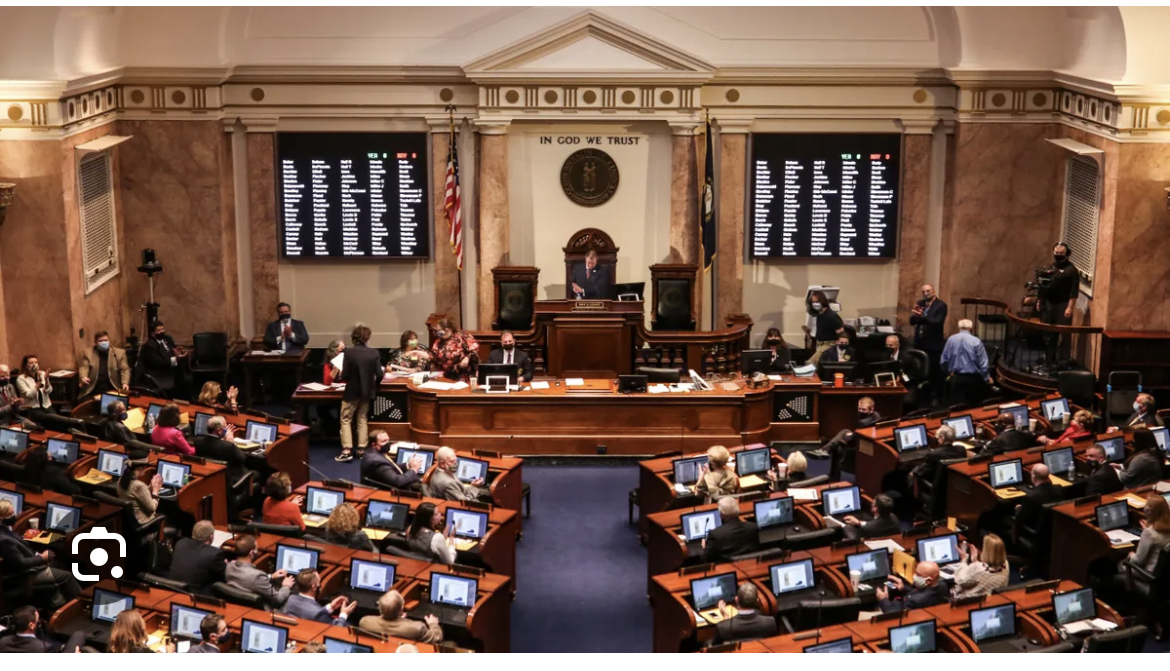
The Lexington Herald-Leader reports:
"The Israeli government is inviting Kentucky lawmakers to bear 'witness to the crimes against humanity' of the Oct. 7 Hamas terrorist attack in an 'exclusive closed door screening' in Frankfort in mid-January" at an undisclosed location.
https://www.kentucky.com/news/politics-government/article283840318.html…
It's doubtful that lawmakers have considered the legal implications of a quorum of members attending a "closed door" meeting. They rarely do.
https://www.courier-journal.com/story/opinion/contributors/2019/01/14/k…
And perhaps, given the gravity of the subject of the gathering, this is natural.
But the Kentucky General Assembly is a public agency as defined in the open meetings law, as the Kentucky Attorney General has determined, and as the Franklin Circuit Court ruled in a 2018 unappealed opinion.
https://apps.legislature.ky.gov/law/statutes/statute.aspx?id=23043
https://www.ag.ky.gov/Resources/orom/1993/93OMD063.htm
https://www.ag.ky.gov/Resources/orom/1993/93OMD064.htm
https://www.ag.ky.gov/Resources/orom/2017/17OMD228.doc
http://static1.squarespace.com/static/5f986190ec1e7d424e58d7f2/5fc51b03…
Lawmakers ignore the open meetings law with reckless abandon. But they are -- as confirmed by the statute they enacted in 1974, by the courts, and by the Attorney General -- subject to the law. As the architects of the law, they should consider the law's implication and application, as well as the critical public policy that supports it, far more often than they do.
Having said this, lawmakers need not be concerned if a quorum of members from either chamber or both chambers accept the Israeli government's invitation.
It is unlikely that their attendance will violate the open meetings law. The reason is clear: the topic of the meeting -- "allowing for leaders to bear witness to the atrocities committed by Hamas terrorists on" October 7, 2023 -- is not a discussion of public business, as defined by the courts, of the Kentucky General Assembly.
(The argument that an invitation to the media absolves lawmakers of wrongdoing is a nonstarter. The law invests the public and the media with the equal right to attend a public meeting. Admitting the media, but not the public, to a closed meeting only exacerbates the open meetings violation based on the prohibition on "selective admission.")
But, again, this "invitation only" gathering does not appear to constitute a public meeting.
Here's why.
In a 1998 Kentucky Supreme Court opinion, Yeoman v. Commonwealth, the Court stated:
"The mere fact that a quorum of members of a public agency are in the same place at the same time, without more, is not sufficient to sustain a claim of a violation of the Act.
"For a meeting to take place within the meaning of the act, public business must be discussed or action must be taken by the agency. Public business is not simply any discussion between two officials of the agency. Public business is the discussion of the various alternatives to a given issue about which the board has the option to take action. Taking action is defined by the Act as 'a collective decision, a commitment or promise to make a positive or negative decision, or an actual vote by a majority of the members of the governmental body.' KRS 61.805(3)."
https://caselaw.findlaw.com/court/ky-supreme-court/1092479.html
In Yeoman, the Court found no open meetings violation when a quorum of the members of the Kentucky Health Policy Board attended a national health care conference in New Jersey. No "public business," as the Court defined the term, was conducted at the New Jersey conference focusing on national health care -- an issue on which the board had no option to take action.
Twenty years latter, however, the Franklin Circuit Court found that a quorum of the members of the House of Representatives violated the open meetings law in holding a closed meeting attended by a quorum of its members to discuss pension reform -- an issue on which the House of Representatives clearly had the option to take action.
Whatever this "exclusive closed door screening" is, it is likely not a public meeting for open meetings purposes. Lawmakers who attend should nevertheless resist the temptation to discuss, for example, resolutions in support of Israel, or any other such action, during the screening. These discussions must be conducted in full public view.
Like the Kentucky Health Policy Board, lawmakers will attend the screening to learn -- not to discuss alternatives to the issue on which they can take action -- by resolution or other means.
This highly unusual and, to the best of my knowledge, unprecedented "invitation only screening" may be the single closed meeting of state lawmakers with which I can find no fault.



